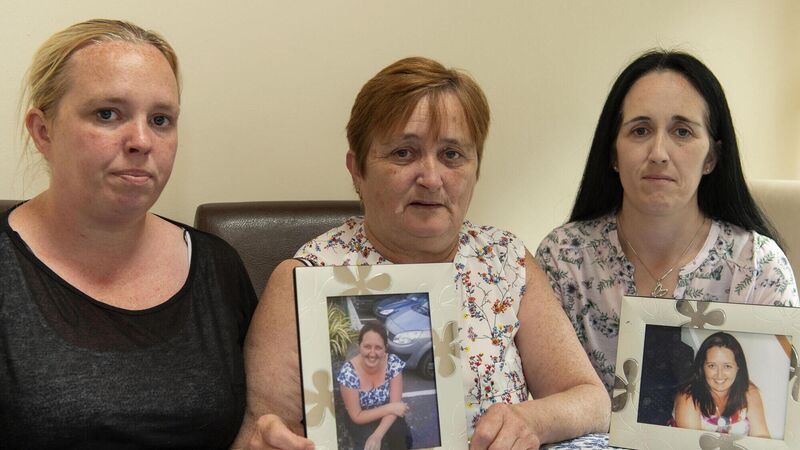Special Report: Family waited seven years for justice - and doesn't want others to face same ordeal

Olivia Dunlea’s sisters, Anne and Amanda, with their mother Ann in 2018. Picture: Michael Mac Sweeney/Provision
The sister of a devoted playschool teacher and mum who was stabbed six times in her bed before her duvet was set on fire as she lay there paralysed from her injuries has called for changes to the justice system after the killer dragged them through the courts for seven years.
Olivia Dunlea, 36, an adored mum of three, was viciously slain by her then-partner of less than three months, Darren Murphy, 42, at her home in Passage West, Co. Cork, on February 17, 2013.
Murphy later admitted killing Olivia but denied murder, claiming that he had been “provoked”, saying that Olivia was seeing another man.
Phone records later proved that this was a lie, but the defence of provocation, which essentially blames the victim for their own death, was used twice by Murphy and his lawyers in a bid to have his charge reduced from murder to manslaughter, which carries a lighter penalty.
Olivia’s sister Anne said it was immediately clear that “that manipulative monster” had killed her sister; that he only admitted it when the bloody evidence was stacked against him; and that he only ever showed remorse when a jury walked into court.

Olivia had collected Anne and her newborn daughter from hospital earlier that day and promised to be back “at the crack of dawn” to see her tiny niece.
The precious photos taken on February 16, just hours before their nightmare began, are the only images Anne has of Olivia with her youngest daughter.
Anne received a missed call from her sister at about 1am. When she called her back, her phone was turned off. “Olivia’s phone was never off and she would never ring me at 1am so I rang his [Darren Murphy’s] phone and the whole story started,” explains Anne.
“He was hysterical, he put on a good act. He said they had an argument at her house, he went home, then someone rang him and said that her house was on fire.
“Straight away I jumped out of the bed and went over there.
“The house was on fire. I had missed the whole show of him trying to get into the house. At that point, he was leaning on the fence with crocodile tears, looking traumatised.
“But it hit me straight away that something wasn’t right.”
Anne immediately suspected Murphy. Olivia had never had a fire in 36 years of life and if she had had an argument with Murphy, she would have been “heartbroken” and have gone “straight over” to Anne’s house to stay for the night.
Murphy’s clothes were on inside out and back to front that morning. He told Anne that was because he had pulled them on quickly as he was running out the door towards the fire.
But they weren’t his going-out clothes, they were a tracksuit and jumper, which Anne thought was odd.
“I kept questioning him because it didn’t add up,” she said.
“And he just roared into my face to ‘F-off’. The guards brought him into the back of the squad car to tell him they had found Olivia. He was sitting in the back seat, saying he ‘couldn’t believe it’. He kept trying to ring her and to get back into the house.
“All this rubbish. How someone could put on that show after doing what he did is horrifying.
“The poor girl didn’t stand a chance.”

What Murphy actually did that night was stab Olivia six times in the head and neck.
He then set fire to her duvet when she was still alive but paralysed due to her injuries. He also lit a fire in the kitchen downstairs.
Professor Marie Cassidy, the State pathologist, said that Olivia was still alive when the fire started because 24% carbon monoxide was found in her lungs, suggesting that she was breathing in the fumes.
Prosecuting counsel Thomas Creed, said in court during the first trial that Murphy could have called emergency services to try to save her. But instead he left, drove her car back to the Rochestown Inn, a pub they had been to earlier that night, collected his own car and threw her keys in a stream to get rid of evidence because he had “detective shows playing in his head”.
Murphy’s lies began to unravel when the clothes he said he was wearing that night, and gave to gardaí, did not match those pictured on CCTV.
Gardaí arrived to his house with a search warrant and he cracked.
“It was only then that he admitted it because he had no choice,” says Anne.
“He didn’t admit it out of guilt.
“He was after hiding the clothes under the decking in the back garden. He put his shoes in the attic.
“He stabbed her six times so I’d say the clothes were blood-stained.
“Apparently he broke down when they said to him that the clothes weren’t the right clothes.”
Anne says that she and her family were convinced from the beginning that Murphy was responsible for their beloved Olivia’s death.
He was always lurking around Olivia like a hulking shadow through their brief relationship, calling to their mother’s house whenever Olivia went to visit, waiting for her after work and even sitting in his car outside her house all night keeping watch — a detail the family learned at one of the three trials.
“Gardaí told us relatively quickly that they were preparing a file for the DPP. It was around the time that her body was released,” says Anne.
“It was horrific. I can’t put into words what that time was like. We didn’t get to see her. It was a closed coffin. We never got to see her or say goodbye or pick her clothes for her to be laid out in.
“When someone dies you should be able to do those things and have your time to say goodbye. We got none of that.
“And everything was gone from the house. The kids literally had nothing. When you’re that age all you want is your mum and your stuff and they lost both. Everything was destroyed. All they had were the clothes on their backs.”
Murphy told gardaí that he attacked Olivia in a jealous rage when she told him that she was seeing someone else.
“Even if she had, it gives him no right to do what he did, but she hadn’t.
“That was heartbreaking. To drag her character through the mud like that.
“Especially with the kind of person that she was. Olivia saw the good in everyone, even when she shouldn’t have.
“She lived for her kids. She was just lovely, very quiet and family orientated.
“So saying that she was with men and everything. It was a disgrace.
“And Olivia couldn’t defend anything said about her.
“Saying that he was provoked is a joke.
“He gave the poor girl an awful death, he really did, and then he tried to destroy her character.”

Murphy made the Dunleas endure three trials and two appeals as he tried to have his sentence reduced from murder to manslaughter.
“The first trial we were shellshocked,” says Anne.
“He was sitting on the bench right opposite us and didn’t bat an eyelid. He looked straight at us, sitting back with his arms stretched over the bench. He wasn’t holding his head in shame or anything.
“But when the jury came in he’d put his head in his hands.
“And he didn’t take the stand once in three trials. He didn’t have to prove his innocence; we, the prosecution, had to prove his guilt.
“And all the chances he had to appeal and have retrials were horrific. We were in complete shock.”
Anne Dunlea now wants the law of provocation to be changed as she feels Murphy should not have been able to lean on the defence twice and torment her family for seven long years of trials and re-trials.
“We were told that the law of provocation hasn’t been changed or amended since hanging was legal in Ireland,” says Anne.
“It really needs to be revamped, the whole justice system does, because you’d really be ashamed. This shouldn’t be happening.
“It was a black and white case. He admitted doing it.
“He didn’t call for help that night.
“He savaged her and tried to hide it and only broke down in tears when he was caught. He didn’t do that out of heartbreak for Olivia.
“So it was very unnecessary what her family and her kids had to go through with three trials and two appeals.
Anne says that Olivia’s children are doing well despite enduring such trauma.
But every time Murphy appealed his sentence — and whenever he appeals it to the parole board in future, which he is legally entitled to do from this year — it plunges Olivia’s children and wider family into the horror of it all over again.
But the children, Anne says, is what has pulled them all through.
“They’re brilliant kids, they’re a credit to her.
“They have her ways, she was a very gentle, loving person, and they have her sense of humour as well. So she’ll never be really gone with them here.”

Darren Murphy used it to appeal his murder conviction twice, his legal team claiming that the law — which essentially allows a victim to be blamed for provoking their own death — applied to his case.
Legal experts say that the defence has often been used in a gendered way to protect male power and to blame the victim in domestic abuse cases — with real or imagined infidelity often identified as the ‘provocation’.
Dr Fiona Donson, director of the Centre for Criminal Justice and Human Rights in the Law School in University College Cork, said that the defence was originally “about chivalry and the right to defend honour".
“Whether we still need it in modern times is questionable and there’s a strong argument to get rid of it,” she says, adding that any such moves must be carefully considered.
Ireland is the only common-law jurisdiction which asks the jury to subjectively apply the defence — to ask whether the defendant, with all their idiosyncrasies, would feel provoked in the situation to kill.
In other jurisdictions, such as the UK, it is applied objectively by asking the jury to consider whether a reasonable person would feel provoked.
If the defendant can prove to the jury that they were subjectively provoked into homicide, the murder charge can reduce to manslaughter in Ireland.
Some legal experts say that the subjective element of the law makes it particularly difficult to explain to a jury, which can lead to verdicts being appealed.
The late Mr Justice Paul Carney, who was the first judge to convict Darren Murphy for Olivia Dunlea’s murder, once called the defence “a graveyard for judges” because appeal courts so frequently overturned the verdict in provocation cases.
A member of the Bar told the this subjective standard for the defence was particularly problematic.
“Where the lack of clarity or confusion comes into it is the fact that it is a subjective situation,” they say.
“When someone says ‘I was provoked’, the law as it stands in Ireland, unlike in the UK, says that you must look at it from a subjective point of view, you must look into the defendant’s mind and decide whether or not he was provoked.

“In England it’s different, you look at it from an objective standpoint, so the jury would look at it from a standpoint of 12 ordinary people and ask ‘ would they be provoked?’”
When the law of provocation was first used, hanging was still legal, some judges say, so a defence of provocation was necessary to save someone from the gallows and commit them to prison instead. “But as we don’t have hanging anymore it’s probably somewhat obsolete and that’s why an objective standard would be preferable,” says the member of the Bar.
“Jurors sometimes get confused when you’re trying to explain to them about trying to look into the mind of the accused with all their foibles.
“And the only way to appeal a conviction for murder is if a judge didn’t explain something properly to the jury.”
On balance, the member of the Bar said they believe there “probably is still a place for provocation but it should be objective not subjective as it has been in England for some time.”
Dr Donson of UCC agrees that the law of provocation needs to change, but she does not expect that change to come anytime soon.
“Provocation is extremely problematic in our jurisdiction," she says.
“Multiple experts have put pressure on the legislature to reform this law but’s fallen on deaf ears.
“Changing the criminal law is never a priority unless something happens and there’s a public outcry,” she says.
In New Zealand, the defence was abolished “overnight” after an angry public demanded reform when a man was acquitted of murdering his partner, but such a reaction has not happened here.
Applying the defence objectively in English and Welsh courts has still caused some confusion, says Dr Donson, warning of the danger of reflexively dropping the defence without carefully considering what other defences would be available to someone who deserved one.
“In a provocation case, the defendant is not disputing that they did it. They’re saying why they did it in the hope that a murder charge will be dropped to manslaughter so they go from a mandatory life sentence to a discretionary one.
“The law is quite complex and hard to explain.
“It’s a recognition of the frailty of the human psyche.
“But in case law from the UK, when a long-abused woman kills her partner there’s often a delay — like smothering him when he slept.
“And according to the law of provocation, it should not be triggered by revenge or with reflection.”
Another difficult aspect of the law, and one which the Dunleas felt keenly, is the fact that the defence blames the victim for their own violent death.
Another problem with provocation, says Dr Donson, is that it can be very unpredictable and arbitrary — its success depends on who’s in the jury, who the lawyers are, and how sympathetic or not the defendant and victim seem to the jury.
It can also make trials last longer as additional evidence is presented and debated.
But she says that reform of this defence in Irish common law is desperately needed because Ireland is already “behind the curve". She adds: “But we need to be reflective and be careful how we do it.
“The courts are built on a very adversarial process and there’s not a lot of space for empathy. Maybe we need to rethink the criminal justice system from beginning to end.”
Seven years, three criminal trials, and to appeals later...
Darren Murphy was first found guilty of Olivia Dunlea's murder at the Central Criminal Court in 2014.
But that conviction was quashed on appeal when the judge’s instructions to the jury on the defence of provocation were challenged.

The jury in a retrial did not return a unanimous guilty verdict in 2017.
But a third trial in the Central Criminal Court found him guilty again in 2018 and sentenced him to life in prison.
Murphy again appealed that verdict on the grounds of provocation.
He also appealed on the grounds that the prosecution provided a "bad character reference" — calling an ex-girlfriend to testify in court that he had been controlling and violent in their relationship.
In a criminal trial you cannot attack the character of the accused because they have a presumption of innocence and previous convictions cannot be presented to the Jury.
But Murphy "threw down this shield on his character" when they questioned a witness eliciting favourable character references, referring to him as a "gentle giant" and making him appear somewhat vulnerable.
This enabled the prosecution to seek to redress this character imbalance and provide their own character witness — an ex-girlfriend who testified that he was controlling and violent.
The Court of Appeal in March ruled that this was legal and reasonable and that the defence of provocation was “without substance”.
The Court of Appeal, therefore, rejected both appeals and upheld the murder conviction in March — seven years, three criminal trials, and two appeals after the murder.
1. Law of provocation: This defence was used by Darren Murphy and his legal team to appeal his conviction twice. Many judges, lawyers, and the Law Reform Commission have called for changes to this common-law defence used widely in murder trials.
2. Exclusion zones: Anne Dunlea and her family would also like to see exclusion zones — like those imposed on sex offenders, or barring orders like those used in abusive relationships — to be imposed on murderers. This, she says, would spare the victim’s family — particularly Olivia’s children in this case — from the further trauma of seeing their loved one’s killer near their home. This concept has been called for by Sinead O’Leary who was brutally stabbed in an attack that killed her best friend Nichola Sweeney in Rochestown, Cork, just kilometres up the road from where Olivia was killed.
3. Longer jail terms for murder: Murphy is technically eligible for parole this year after serving seven years in jail and although Anne says that a new parole act, which would see the minimum jail term for life extended from seven to 14 years is some improvement, she thinks that taking someone’s life should mean life in prison for murderers.
4. Less escorted day release trips for murderers: Olivia Dunlea’s family was horrified to hear that Darren Murphy was back in Olivia’s previous hometown of Passage on escorted day release to visit a grave last year. “He was back to see his mother in Marymount who was dying during the trial which is one thing,” says Anne. “But then he was back in passage to visit a grave too. Visiting a grave is a luxury. We were horrified that he could do that. It should not be allowed.”





